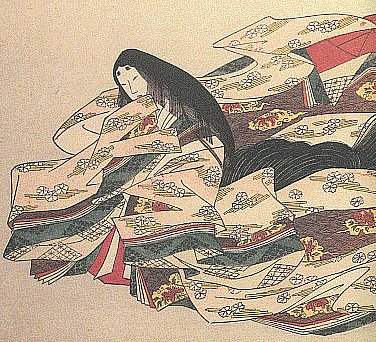For one weekend only Villanova University presents a staged reading of THE BEAUTIFUL LIFE OF THE WOMAN KOMACHI, adapted by Joanna Rotté and directed by Elizabeth Dowd. Noh (nō) is an ancient form of Japanese theatre from the 14th century, derived from traditional Chinese performing arts and Japanese dance. Considered more refined than traditional Kabuki, it is storytelling combined with mask, music and dance. There has been a revival of Noh in recent years. Bloomsburg faculty member Dowd has brought her knowledge of Noh to Villanova with a beautifully written adaptation of heroine Komachi’s life, a beautiful and sought after poet who’s both tragic and joyous life story is artfully told by the students of the theatre department.
Though the play is a reading, the actors are dressed in a contemporary semblance of traditional costume, complete with props, a simple set, and beautifully accompanied by composer and Noh actor David Crandall. The reading was not a hindrance to the performances, rather, after a short while the audience barely noticed the actors were reading, a testimony to the skill of the students, the few professional union actors cast, and director Dowd’s abilities.
The production did lack energy; Noh can have the reputation for being boring, with very little action onstage, but rather a focus on pure storytelling. The first half (consisting of 3 short acts) was a little tedious, especially for an American audience. However the second half was much livelier, largely due to both seasoned actresses who played Komachi in her later years, playwright Joanne Rotté and Janet Fishman. Youngster James Tedjeske was adorable, and brave to be part of a difficult piece for adults, let alone a pre-teen (or close to it, his age unknown).
The appeal of Noh is largely in the writing and the aesthetics. Rotté’s adaptation was faithful to Noh’s tradition of timeless themes, beautiful imagery and a great appreciation of nature. Though clearly the story has a Buddhist undercurrent, the playwright references a theme that crosses both continents and faiths. In the final act Komachi has an epiphany, “I recognize desire as the cause of suffering,” that same idea is found much earlier, in the New Testament Book of James (James 1: 14-15).
Kudos to Dowd for her evident passion for Japanese Noh, and her courage to bring what could be seen as a difficult piece to an American audience.
THE BEAUTIFUL LIFE OF THE WOMAN KOMACHI
Adapted by Joanna Rotté
Directed by Elizabeth Dowd
Villanova University Theatre
January 18 – 20, 2013
800 East Lancaster Avenue
at the Connelly Center
Villanova, PA 19085
610-519-4500
http://www1.villanova.edu/villanova/artsci/theatre/productions/season.html


